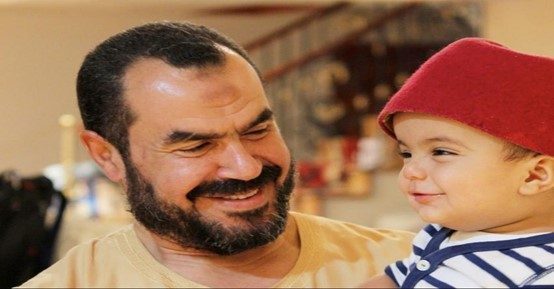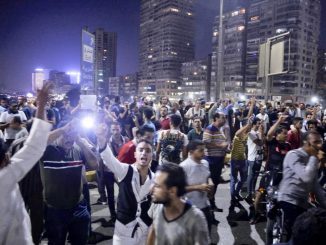
Family of Dr. Salah Soltan, the academic detained in Egypt, accuse US of breaking pledge to help release him.
Dr. Soltan, a US green card holder and critic of Abdel-Fatah al-Sisi, says he faces death in Cairo jail and urges Biden to act.
Dr. Salah Soltan, a prominent Egyptian prisoner of conscience has told his family that he faces death in detention, spurring them to accuse the Biden administration of abandoning their father, despite previous promises on human rights.
In a letter smuggled out of prison, Salah Soltan, an Islamic jurisprudence scholar, said he felt “as if I stared death in the eyes while lying on the ground, paralysed and denied help and medicine for days,” after collapsing in his cell earlier this year following complaints of chest pains. His family say the letter was his first unsupervised contact in two and a half years.
Human Rights Watch said Egyptian prison authorities had denied the 62-year-old proper medical treatment, despite his history of heart problems. A group of 20 medical specialists warned earlier this year that, without specialised healthcare, “the likelihood of Mr Soltan losing his life [is] high”.
Salah Soltan’s family say the Biden administration is backsliding on its promises to help free their father.
“It’s become clear to our family that the Biden administration is reluctant to put the necessary efforts required to secure our dad and other prisoners’ release. When dealing with Egypt, the Biden administration is actively choosing not to prioritise protecting its own citizens’ safety and freedoms,” they said in a statement, according the the Guardian.
Salah Soltan is a religious scholar and former deputy minister under president Mohamed Morsi, who was deposed in a military coup in 2013. Soltan was arrested later that year, and remains in solitary confinement in the Badr prison complex north-east of Cairo – one of many new prisons constructed under Egypt’s Abdel-Fatah al-Sisi to jail critics and dissidents.
Rights groups have reported that Egyptian authorities routinely deny prisoners medical care, leading to harm and in some cases preventable deaths.
In his letter from prison, Salah Soltan also said that he had renounced some former beliefs he now considers antisemitic. His family hope their father’s public change of views will remove any lingering concerns for US politicians previously reluctant to advocate for his freedom.
“The letter from our dad is important to set the record straight,” said the Soltan family. “It is our hope that it will help people see our dad for who he is: a man of honour and courage who is at death’s door and deserves to be saved.”
Compounding the problem for Soltan is the Egyptian authorities’ apparent determination to punish him for his son’s advocacy. Mohamed Soltan was imprisoned for two years alongside his father and freed following a prolonged hunger strike in 2015, and has since become a prominent human rights advocate.
According to the UN working group on arbitrary detention, prison authorities have routinely subjected Salah Soltan to severe reprisals for his son’s work, including breaking his jaw.
After Mohamed Soltan attempted to sue a former Egyptian prime minister in the US for his role in his arrest years prior, five of his cousins in Egypt were detained for months.
In 2020, Joe Biden, then a candidate, cited Mohamed Soltan’s case and the Egyptian authorities’ efforts to punish his family as an example of transnational repression, tweeting that “arresting, torturing, and exiling activists like Sarah Hegazy and Mohamed Soltan or threatening their families is unacceptable. No more blank checks for Trump’s ‘favorite dictator’”.
But Biden’s promise to curb aid without conditions for Egypt remains unfulfilled. The US gives Egypt an average $1.3bn in military aid annually.
Last year, the Biden administration opted to withhold $130m in military aid to Egypt over human rights conditions. But it permitted another $75m in aid, on the grounds that Egypt had freed a thousand political prisoners – overlooking that almost three times as many had been arrested and thousands more had their detention renewed.
Eleven members of Congress wrote to the US secretary of state, Antony Blinken, earlier this year to demand the administration withhold $320m in military aid while “Egypt continues to engage in transnational repression beyond its borders against family members and relatives of dissidents and activists”.
Ten senators including Elizabeth Warren, Tim Kaine and Ben Cardin also wrote to Blinken to demand $320m in aid be withheld, citing the detention of “tens of thousands of political prisoners, including at least two United States legal permanent residents”, in a nod to Salah Soltan’s case.
“As a candidate, President Biden used my name and my family’s plight to promise a policy of ‘No blank checks’ to Egypt. I am extremely disappointed that they are not living up to the promises they made,” said Mohamed Soltan.
A state department spokesperson said: “We have encouraged the government of Egypt to ensure Mr Soltan and all detainees have access to appropriate medical care.”



